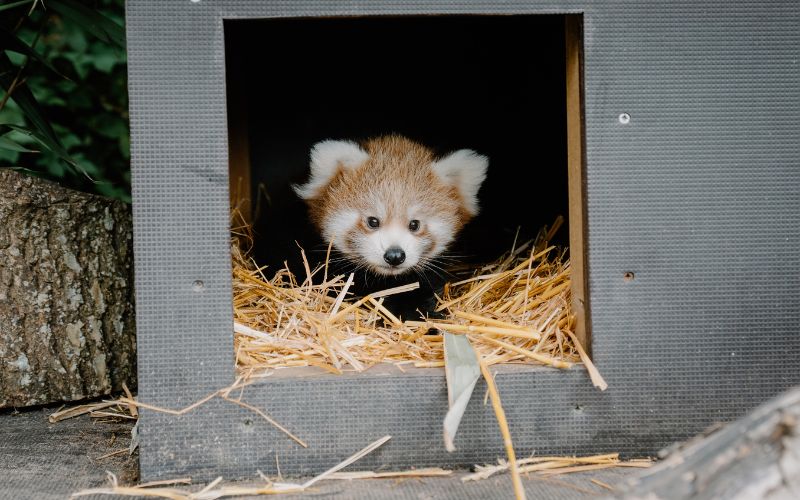Ciswe the orangutan sits on the edge of the rain-soaked boardwalk, her back stooped in despair, and her fingers wrapped around her feet, ready to rock back and forth – a self-soothing habit usually reserved for those under stress.
‘She’s an orangutan in mourning,’ our Tanjung Puting National Park forest guide explains. ‘Ciswe is 35 and she’s just had a miscarriage. She won’t be able to have babies again.’ As if aware of being the focus of attention, Ciswe swivels to face her sympathetic audience, deliberating whether to carry on pulling on the heartstrings or move onto the purse strings.
Our guide ushers us along the jungle footpath towards our awaiting klotok river boats, explaining that although Ciswe may be in the depths of orangutan despair, this middle-aged primate also has a reputation for a spot of daylight robbery.
She decides on the latter, uncoiling her 50kg weight out of a sitting position and onto all fours to begin a dignified yet determined knuckle walk towards our group. Our guide urges us to pick up pace, ushering the ramshackle group along the jungle footpath towards our awaiting klotok river boats, explaining that although Ciswe may be in the depths of orangutan despair, this middle-aged primate also has a reputation for a spot of daylight robbery.
Deadly Orangutan Decline
Ciswe is a resident of the 4,150km² Tanjung Puting National Park, an area of protected coastal tropical heath and peat swamp forest in Indonesian Borneo’s Central Kalimantan province. It is one of last places left in the world where these red, shaggy-haired primates can still be seen in the wild, but with only an estimated 50,000 Bornean orangutans left, down from roughly 315,000 a century ago, Ciswe is one of a dying breed.
Indonesia has one of the highest deforestation rates in the world. More than 74 million hectares of rainforest – an area nearly twice the size of Japan – has been logged, burned or degraded in the last half-century.
A laundry list of challenges for survival face the critically-endangered Bornean orangutans from the illegal pet trade to hunting for meat. But the loss of their habitat from deforestation due to palm oil, logging and mining is the deadliest. Combined these threats result in the death of 2,000 to 3,000 orangutans every year.
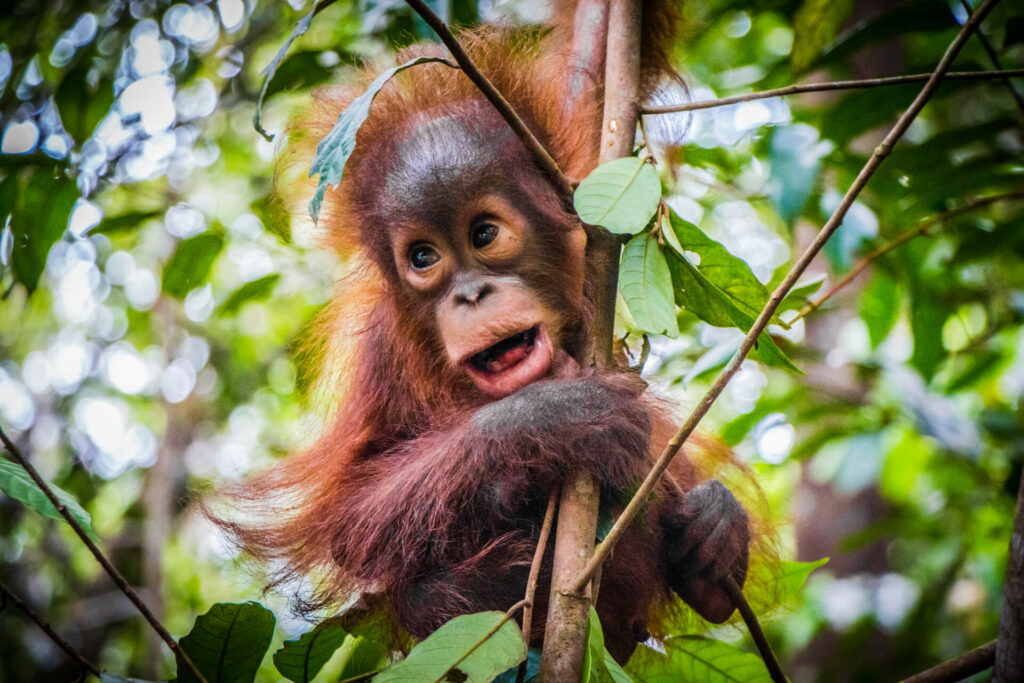
Indonesia has one of the highest deforestation rates in the world, and only half of the country’s original forest cover now remains. According to non-profit Greenpeace, more than 74 million hectares of rainforest – an area nearly twice the size of Japan – has been logged, burned or degraded in the last half-century.
Although estimates vary, studies suggest more than a million hectares of rainforest is cleared annually with around 70 per cent of that occurring in forests on mineral soils and 30 per cent on carbon-rich peatland forests.
The Palm Oil Problem
Deforestation in Indonesia has been largely fuelled by an insatiable global demand for the world’s most popular vegetable oil – palm oil – used in biofuel and many everyday food and cosmetic products and of which Indonesia is the leading global producer.
Palm oil grows in peatlands in wet, tropical environments that Borneo offers in abundance. Traditionally grown in monocultures, its cultivation requires enormous areas of primary tropical rainforest to be drained and burned, the effects of which are devastating.
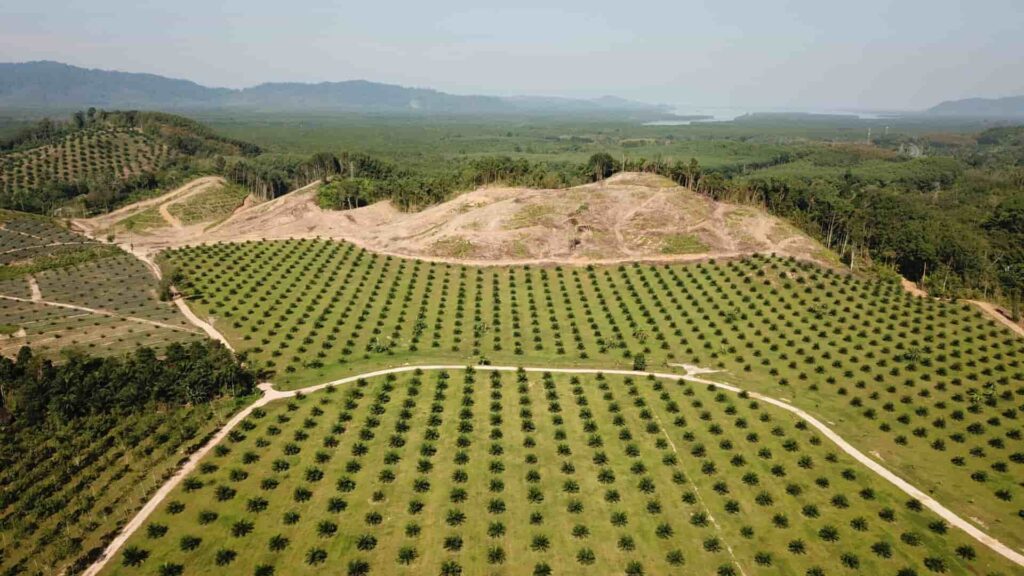
‘In general, when oil palm replaces forest, between 80 and 100 per cent of the mammal, bird and reptile species disappear,’ Michelle Desilets, Executive Director at The Orangutan Land Trust tells The Ethicalist.
‘Orangutans may be driven out or stranded in small patches of forest and, facing reduced abundance of food sources, may starve. They will often venture into the oil palm plantation to seek some nutrients from the young palm fronds or fallen fruit but in some plantations, orangutans are seen as an agricultural pest or a threat to humans.
‘Orangutans are seen as an agricultural pest. Rescue teams have found orangutans beaten unconscious or to death with wooden planks or iron bars, butchered by machetes, riddled with air rifle pellets, drowned, and doused in petrol and set alight’
‘Rescue teams have found orangutans beaten unconscious or to death with wooden planks or iron bars, butchered by machetes, riddled with air rifle pellets, drowned, and doused in petrol and set alight.’
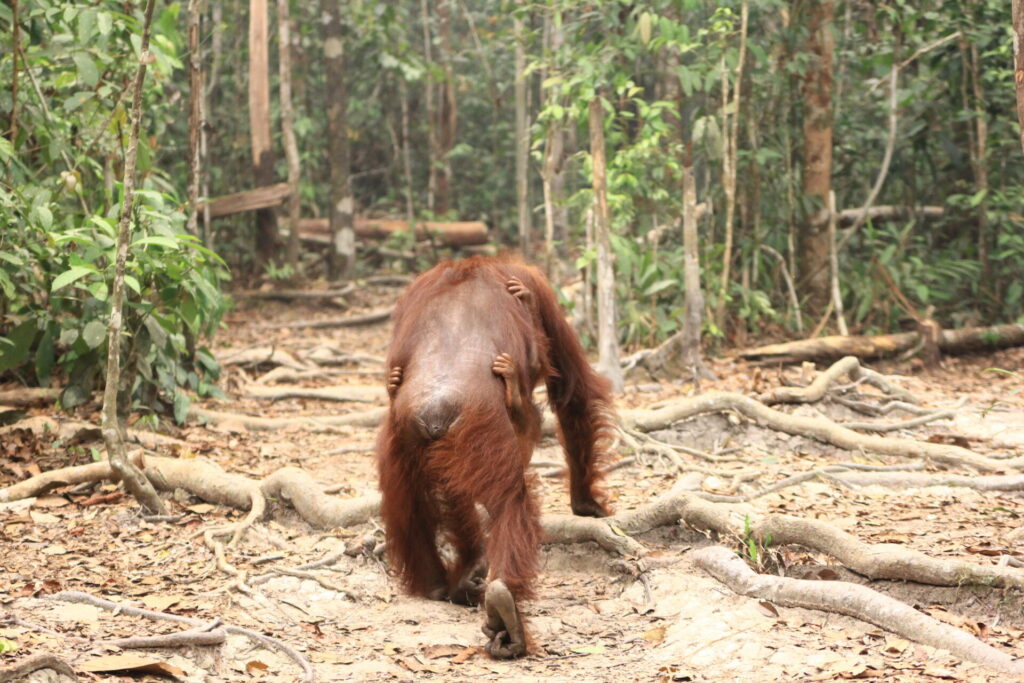
Indonesia typically exports around 45 million metric tonnes of palm oil per year in a sector that employs 17 million workers both directly and indirectly. Bringing in $29 billion annually, it contributes 3.5 per cent to Indonesia’s GDP.
With such huge – and growing – demand comes rapid deforestation and alarming ecological results. The environmental destruction increases greenhouse gas emissions by annihilating carbon-absorbing rainforest, which in turn drives global warming.
A recent study has projected that deforestation in Borneo will destroy an area the tenth of the size of Italy in the next decade, destroying the habitat of more than 26,000 orangutans.
Deforestation also threatens biodiversity with many animals injured, killed or displaced in the process; orangutans are one of the worst affected. A recent study entitled Perspectives in Ecology and Conservation has projected that deforestation in Borneo will destroy an area the tenth of the size of Italy in the next decade, destroying the habitat of more than 26,000 orangutans.
‘Deforestation has a huge impact on the environment and wildlife,’ says Rachel Agnew from The Rainforest Foundation UK. ‘The world’s forests are home to 80 per cent of the world’s terrestrial species of animals, plants and insects. Deforestation results in the loss of habitats for land species, and as a result we are seeing an increasing number of these species being listed as threatened or endangered.’
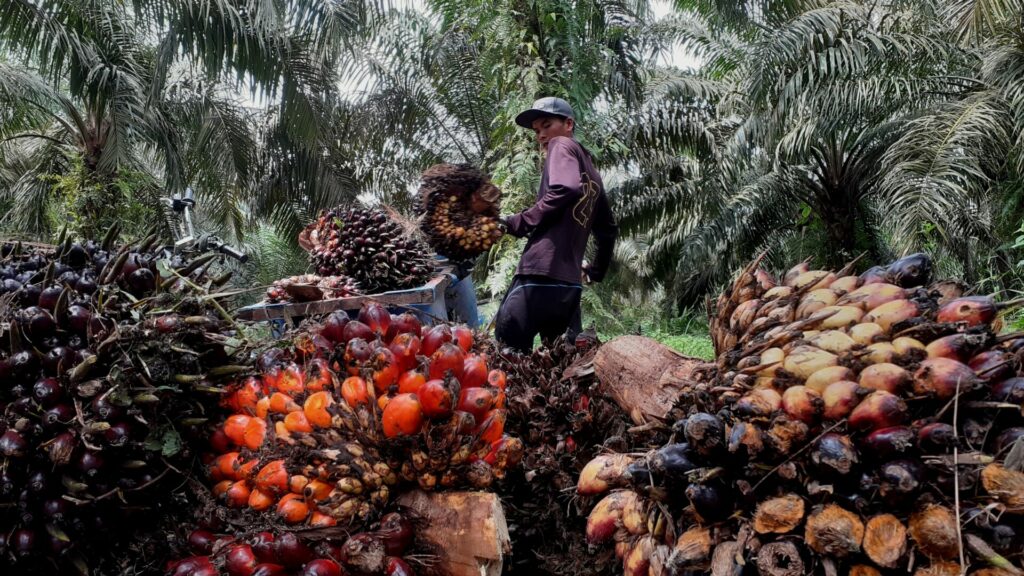
The Bornean Orangutan was officially moved up a tier from ‘endangered’ to ‘critically endangered’ by the International Union for the Conservation of Nature (IUCN) in 2016, the last time these primates were assessed. This shift in status which saw them join their cousins the Sumatran Orangutan, means they now face ‘an extremely high risk of extinction in the wild’.
IUCN authors wrote at the time: ‘Bornean Orangutans decreased by more than 60 per cent between 1950 and 2010, and a further 22 per cent decline is projected to occur between 2010 and 2025. Combined, this equates to a loss of more than 82 per cent over 75 years.’
From Cookies to Cosmetics
Palm oil plantations – referred to as green deserts for their almost entire lack of biodiversity – now stretch across more than 27 million hectares of the Earth’s surface, an area the size of New Zealand. This is expected to increase even more due to palm oil usage in biodiesel.

Extracted from the pulp of the palm fruit, this versatile oil can be found in 50 per cent of all packaged consumer goods on supermarket shelves, from cookies to pizzas, chocolates to detergents and even canned pet food.
It is also significantly deployed in the cosmetics industry due to its ability to add smoothness and foam; you can find it in almost all products including soaps, shampoos, face creams, lipsticks, and toothpaste.
Biodiesel made from palm oil and soybean oil has been categorised as a high-risk of causing deforestation and emitting more greenhouse gasses than the use of fossil fuels
As global awareness of the palm oil problem has grown, many consumers have opted for products that are free of the oil however many are still inadvertently filling up their cars with palm oil biodiesel.
The EU is the world’s largest biodiesel producer. In 2020 palm oil accounted for 18 per cent of the product used to make the fuel after rapeseed – also known as canola – oil (38 per cent) and used cooking oil (23 per cent).

However, last year under the Renewable Energy Directive II (RED II) which will be in effect until 2030, biodiesel made from palm oil and soybean oil has been categorised as a high-risk of causing deforestation and emitting more greenhouse gasses than the use of fossil fuels. This means EU member states can no longer attribute palm oil-based biofuels towards their renewable energy and climate targets.
With the global palm oil market set to reach $98 billion by 2030, according to a report published by Grand View Research, and the WWF reporting that the Indonesian government plans to increase oil palm production to 51 million tonnes in the next year, environmentalists are urging industry players to clean up their act, fast.
Sustainable Palm Oil
Some advocates have called for an outright boycott of palm oil (#SayNoToPalmOil) but most environmental campaigners agree that this is not the best solution. Instead they advocate for sustainable practises to be universally adopted across the industry.
That means working closely with the Roundtable on Sustainable Palm Oil (RSPO), the industry’s certification body, and more recently the Palm Oil Innovation Group (POIG), a group of progressive RSPO members who joined forces with non-governmental organisations such as Greenpeace and Rainforest Action Network to push companies to fully adhere to ‘no deforestation, no peat development, and no exploitation’.
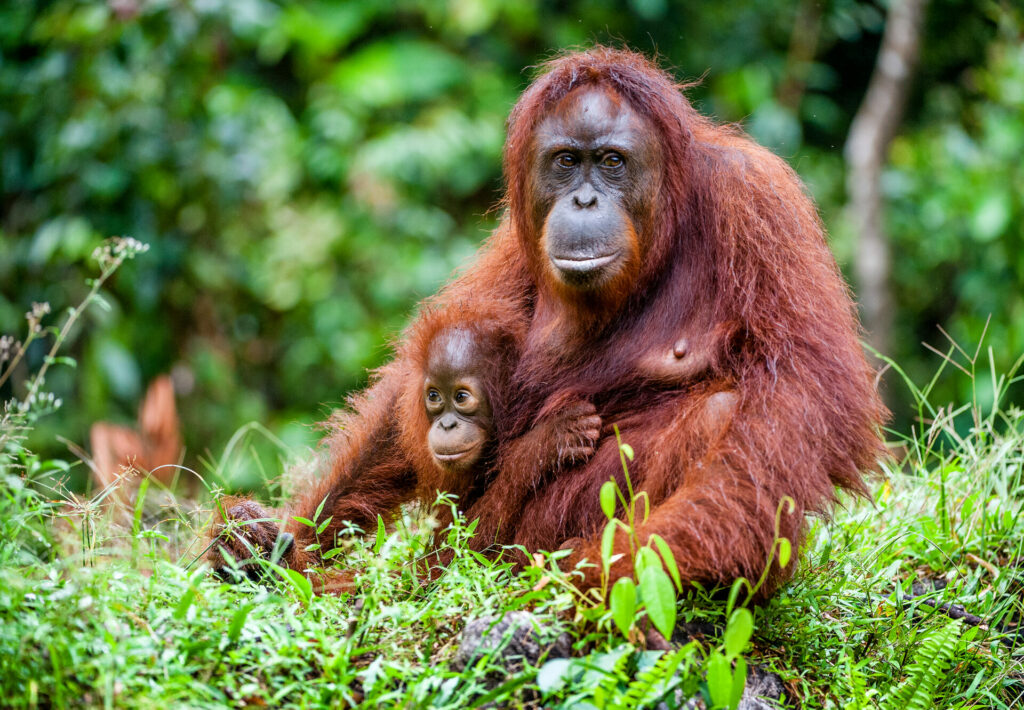
‘The RSPO sets a lower threshold or bar,’ explains Michelle Desilets. ‘And while this bar is easier to reach (allowing for greater inclusivity across the industry), it does represent a standard of production infinitely superior to ‘business as usual’. It is an imperfect solution but an absolutely necessary part of the toolkit to transform the industry.’
We know that even if we protect every orangutan in every single national park throughout their range, in perpetuity, that’s not enough orangutans to ensure the species won’t become extinct.’
With 80 per cent of orangutan populations dwelling outside of protected areas, well-managed plantations that are both economically viable and do not encroach on precious orangutan habitat are not only an opportunity, but a necessity according to the International Union for the Conservation of Nature (IUCN)’s Andrew Marshall,‘We know that even if we protect every orangutan in every single national park throughout their range, in perpetuity, that’s not enough orangutans to ensure the species won’t become extinct.’
But it’s not all doom and gloom for the great ape. A study by Borneo Futures for the PONGO (Palm Oil & NGO) Alliance, after looking at 2,717 Borneo plantations, provides evidence that RSPO-certified concessions lose 25 times less forest and orangutan habitat than non-certified ones.
Research has also shown that the average carbon footprint of Certified Sustainable Palm Oil is 36 per cent lower than for non-certified palm oil.The next stage is to stem illegal or unsustainable plantations, and ensure the expansion of certified lands.
‘My good friend used to be a [forest] warden,’ explains local tour guide Eiros, ‘but he moved to palm oil because it pays more. When I asked him about the orangutans, he said he needed money and that it was someone else’s problem.’
Over the past few years, a series of commitments have been adopted by major brands to stop purchasing palm oil-linked to deforestation. As of 2023 around 17 per cent of palm oil traded globally is covered by such commitments with some major palm oil buyers in the West such as Unilever, Mars, Nutella and Kellogg requiring certification of environmentally sound practices.
‘Indonesia is not going to stop producing palm oil,’ says Andrew Marshall. ‘It is a poor country with lots of hungry people who deserve to have healthcare, be well-fed and fulfil their aspirations and palm oil is four times more productive than anything else you can plant on that land.’
It is a sentiment echoed by locals in Kalimantan. ‘My good friend used to be a [forest] warden,’ explains local tour guide Eiros, ‘but he moved to palm oil because it pays more. When I asked him about the orangutans, he said he needed money and that it was someone else’s problem.’
Consumer choices
For the concerned consumer, working out which products do or don’t use deforestation-free, certified sustainable palm oil (CSPO) can be a complicated process. Few products voluntarily display the RSPO trademark and a vast number of food products simply list palm oil as ‘vegetable oil’. Non-food products that use derivatives of palm oil have more than 200 alternate names to choose from (see a list here).
With a growing awareness among consumers, thanks to a clear message being relayed by environmental advocates through social media channels, there is consensus that the status quo is far from OK. Consumers can access a wealth of information simply by digging a little deeper and asking a few tough questions of their favourite brands.
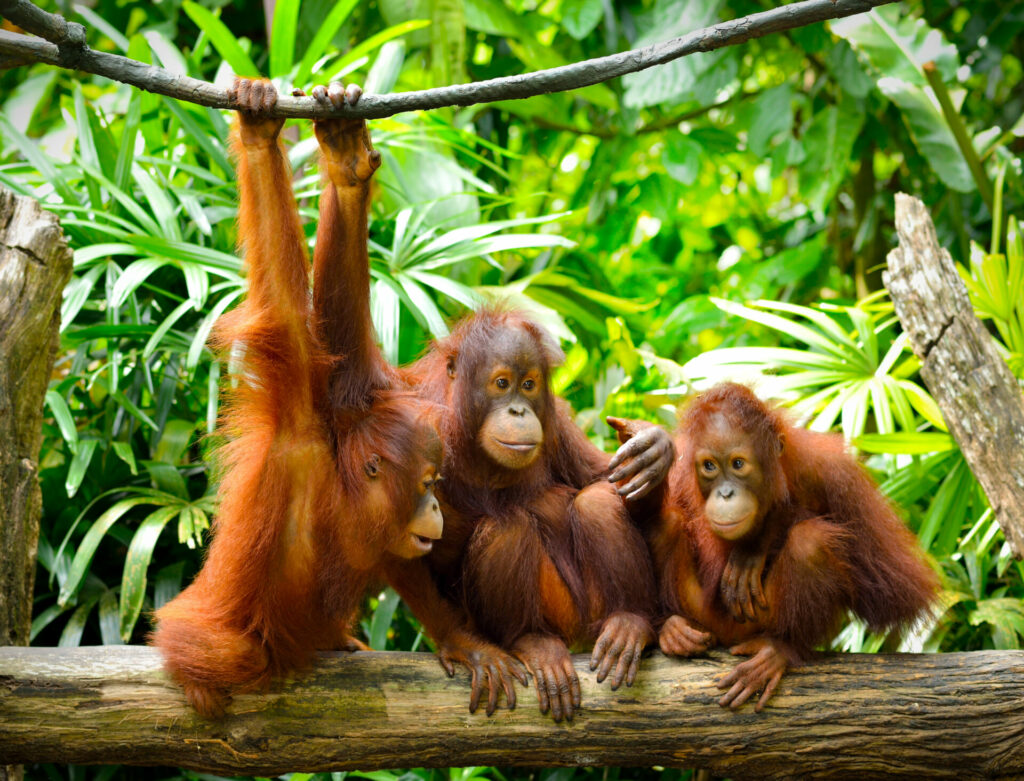
‘One can consult various scorecards (Greenpeace, UCS, RAN Oxfam) and get an idea how brands, retailers and growers are performing,’ explains Desilets, ‘or use an app such as PalmSmart. But more importantly, we would like to ask consumers to communicate with the brands and retailers, via social media, direct telephone, email or just tell them, ‘I want deforestation-free certified sustainable palm oil in products containing palm oil.’
This in turn will force retailers to ensure their suppliers use CSPO in their products. This demand ultimately works its way along the entire supply chain to producers, who must then adopt best practice.
Making informed choices will allow consumers to bring about positive change to the industry, such as calling for mandatory transparent product labelling on all items containing palm oil. The United States, the European Union and Canada all now require detailed labelling. In the six months leading up to the EU labelling introduction, demand for CSPO increased by 67 per cent – evidence that consumer action can succeed.
Deforestation-free commitments are key to the survival of orangutans like moody but mischievous Ciswe, because, as Michelle Desilets states bluntly, ‘Wild orangutans NEED forests to survive.’











